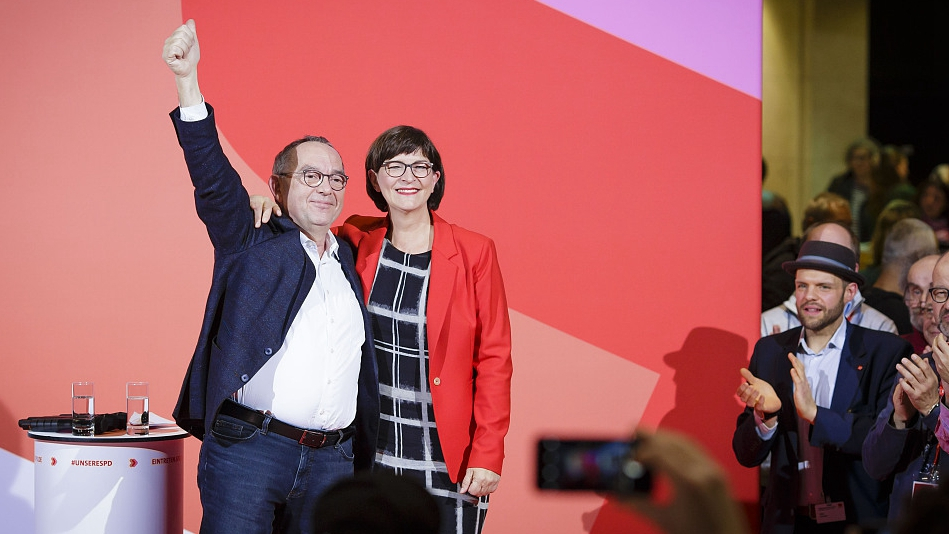
Newly-elected co-leaders of Germany's Social Democratic Party Saskia Esken (R) and Norbert Walter-Borjans in Berlin, Germany, November 30, 2019. (Photo: VCG)
The future of Germany's ruling coalition – and by extension the chancellorship of Angela Merkel – is uncertain after the election of new leaders of the Social Democrats (SPD).
Two strong leftist critics of the SPD's coalition with Merkel's Christian Democrats (CDU), Norbert Walter-Borjans and Saskia Esken, won a vote for the leadership of the party on Saturday.
Their victory raises the chances of an early election or a minority government if the SPD leaves the coalition, and Merkel has said she will not stand for a fifth term as chancellor.
What does the SPD want?
Walter-Borjans and Esken, who ran on a joint ticket, want to renegotiate the coalition deal to focus more on social justice, investment and climate policies, setting them on collision with the CDU.
Speaking on public broadcaster ARD on Sunday, Walter-Borjans said raising investments and scratching temporary job contracts were issues that needed to be addressed.
"If the coalition partner then takes an obstructive approach for these new tasks then you have to make a decision that it cannot continue," he said.
SPD members expect that the new leadership duo will not recommend leaving the coalition but rather will seek more concessions from the CDU, including dropping the target for a balanced budget and raising the minimum wage.
Senior members of the CDU insisted there would be no renegotiation.
SPD delegates are set to approve the leadership at a party conference starting on December 6. They will also vote on the coalition.
What could happen next?
The election of Walter-Borjans and Esken has thrown Germany's coalition into uncertainty.
Here are four possible scenarios:
Coalition continues
Walter-Borjans and Esken could opt to stay in the ruling "grand coalition." The SPD is polling at around 15 percent, down from the 20.5 percent it won in the 2017 national election, and so risks losing parliamentary seats if it breaks off the coalition and new elections ensue.
To stay in the coalition, Walter-Borjans and Esken could negotiate an enhanced coalition deal with concessions from the conservatives. Alternatively, they could define the party's demands for the next national election, due in 2021, while committing to the existing coalition agreement.
Minority government
Conservatives say they would not agree to certain demands, such as a significantly higher minimum wage. Should the SPD insist on these, it would have no choice but to quit the government, opening the way for minority rule by the CDU and its Bavarian sister party, the Christian Social Union. Merkel would remain chancellor.
Supporters of the idea note that the 2020 federal budget has been passed, so a minority government could rule relatively trouble-free until spring 2021.
New coalition
Should the existing coalition collapse, the conservatives could try to form a ruling alliance with the Greens and the business-friendly Free Democrats (FDP).
The three parties held coalition talks after the 2017 election, only for the negotiations to collapse when the FDP pulled out. However, the Greens have enjoyed a surge in support since 2017 and have more interest in new elections than revisiting coalition negotiations.
New elections
New elections would jeopardize political projects now working their way through the legislative process including a new basic pension, and a climate protection package.
Nonetheless, conservatives regard this as the most likely scenario should the SPD quit the coalition. Many of them want the SPD to decide quickly on its new course.


